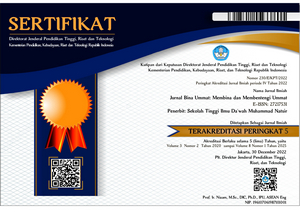STRATEGI KOMUNIKASI DA’WAH TGH. LALU MUCHSIN EFFENDI MUCHTAR MELALUI FORUM KERUKUNAN UMAT BERAGAMA (FKUB) DALAM MEWUJUDKAN KERUKUNAN BERAGAMA DI LOMBOK UTARA
DOI:
https://doi.org/10.38214/jurnaldawahstidnatsir.v7i1.235Keywords:
Da'wah, CommunicationAbstract
Research Objectives: Knowing Tgh. Lalu Muchsin Effendi Muchtar's Da'wah Communication Strategy Through FKUB in Creating Religious Harmony. Research Methods: Qualitative. Research Results: Tgh. Lalu. Muchsin Effendi Muchtar at FKUB in realizing religious harmony in North Lombok with various approaches and communication strategies to people who are not only Muslim. Conclusion: Tgh. Lalu Muchsin Muchtar himself uses a da'wah communication strategy, namely getting to know the audience: cross-religious discussions, cultural approaches, friendship between religious leaders, composing messages: conducting studies, seminars, providing exemplary and fiqhud da'wah approaches, establishing methods: deliberations and analysis These approaches were of course chosen after looking at the da'wah map of the North Lombok area, which is structurally very multi-cultural and multi-religious.
Published
How to Cite
Issue
Section
Copyright (c) 2024 Jurnal Da'wah: Risalah Merintis, Da'wah Melanjutkan

This work is licensed under a Creative Commons Attribution 4.0 International License.
This work is licensed under a Lisensi Creative Commons Atribusi 4.0 Internasional.
Authors who publish with this journal agree to the following terms:
- Authors retain copyright and grant the journal right of first publication with the work simultaneously licensed under a Creative Commons Attribution License that allows others to share the work with an acknowledgment of the work's authorship and initial publication in this journal.
- Authors are able to enter into separate, additional contractual arrangements for the non-exclusive distribution of the journal's published version of the work (e.g., post it to an institutional repository or publish it in a book), with an acknowledgment of its initial publication in this journal.
- Authors are permitted and encouraged to post their work online (e.g., in institutional repositories or on their website) prior to and during the submission process, as it can lead to productive exchanges, as well as earlier and greater citation of published work (See The Effect of Open Access).




